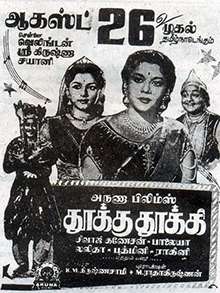Thookku Thookki
Thookku Thookki (transl. The Carrier) is a 1954 Tamil film based on the play of the same name. It stars Sivaji Ganesan, Lalitha and Padmini.[1]
| Thookku Thookki | |
|---|---|
 Theatrical release poster | |
| Directed by | R. M. Krishnaswami |
| Produced by | Aruna Films |
| Written by | A. T. Krishnasamy V. N. Sambandham |
| Starring | Sivaji Ganesan Lalitha Padmini |
| Music by | G. Ramanathan |
| Cinematography | R. M. Krishnaswami |
| Edited by | R. M. Venugopal |
Production company | Aruna Films |
| Distributed by | Aruna Films |
Release date | 26 August 1954 |
| Country | India |
| Language | Tamil |
Plot
A young prince Sundarangathan (Sivaji Ganesan) hears the above-mentioned maxims at a debating society and sets out to prove them wrong. He had been sent to tour the country by his father, the King, to find wealth as well as new ways to improve the economy which is facing troubles. Testing the first statement he deliberately goes home empty handed. He is scolded and banished by his father. But his mother vows to protect him in her palace, proving the second one too. He moves on to test the third one out. He visits his married sister, who welcomes him with big feast but quickly sours and insults him once she knows he hasn't brought any valuable gift. As the feasts get downgraded to leftovers served rudely, he confronts her and angrily walks out, acknowledging defeat. Next up is his wife, princess in nearby Kingdom – who is having a not-so-secret affair with a clothing merchant, Namakkram (T. S. Baliah). She tries to poison the prince's mind about his childhood friend who learns about the affair, to discredit him. Caught in a dilemma, Sundarangathan enters employment of the merchant in disguise and learns the truth. Proving the fourth statement right, the wife tries to get him killed once she suspects he has figured out the truth. But he escapes. Not contented, the wife convinces her father to declare him a traitor for trying to grab the entire kingdom and conspiring to kill her and the King too! He then flies to another city feigning lunacy, where he finds Madhavi (Padmini) princess of the empire of Madhurapuri. He foils the attempt of the royal family's teacher's son to wed her by force. But his identity is revealed in the process and he is extradited back to his father-in-law's country to face trial. The film concludes on a happy note with the truth revealed, thanks to help from the friend who literally saves his life, proving the final statement too. The wife commits suicide and Sundarangathan and Madhavi get married.
Cast
Cast according to the film's songbook[2]
|
|
|
Crew
- Producer: M. Radhakrishnan
- Production Company: Aruna Films
- Director: R. M. Krishnaswami
- Music: G. Ramanathan
- Lyrics: Udumalai Narayana Kavi, Thanjai N. Ramaiah Dass & A. Maruthakasi
- Story:
- Screenplay:
- Dialogues: A. T. Krishnasamy & V. N. Sambandham
- Art Direction: Raju
- Editing: R. M. Venugopal
- Choreography: V. Madhavan
- Cinematography: R. M. Krishnaswami
- Stunt: Stunt Somu
- Dance: None
Production
The film was an adaptation of stage play of same name which was made into a film in 1935 starring CVV Banthulu.[1][3]
Soundtrack
The music was composed by G. Ramanathan. Lyrics by Udumalai Narayana Kavi, Thanjai N. Ramaiah Dass & A. Maruthakasi. Playback singers were T. M. Soundararajan, V. N. Sundharam, M. L. Vasanthakumari, P. Leela, M. S. Rajeswari & A. P. Komala.
In less than 12 hours, Narayana Kavi wrote five of the eight songs, which were composed immediately by G. Ramanathan, rehearsed by T. M. Soundararajan and others.[1] When TMS was chosen as playback singer, Sivaji objected to the choice and wanted CS Jayaraman to sing all the songs. After hearing TMS's rendering, Sivaji was impressed with him and TMS went on to sing a lot for Sivaji.[4] The song "Sundari Soundari" is set in Kurinji raga.[5]The song "Pengalai Nambaadhe Kangale" is set in Maand raga.
| No. | Song | Singers | Lyrics | Length (m:ss) |
|---|---|---|---|---|
| 1 | "Eraadha Malaidhanile" | T. M. Soundararajan | Thanjai N. Ramaiah Dass | 03:12 |
| 2 | "Inba Nilai Kaana Innum En" | M. S. Rajeswari | A. Maruthakasi | 03:55 |
| 3 | "Sundhari Soundhari Nirandhariye" | P. Leela, A. P. Komala & T. M. Soundararajan | A. Maruthakasi | 04:55 |
| 4 | "Pengalai Nambaadhe Kangale" | T. M. Soundararajan | Udumalai Narayana Kavi | 02:06 |
| 5 | "Pyari Nimbal Mele Namke Majaa" | V. N. Sundharam & M. S. Rajeswari | Udumalai Narayana Kavi | 03:06 |
| 6 | "Abaaya Arivippu Aiyaa Abaaya Arivippu" | T. M. Soundararajan | Thanjai N. Ramaiah Dass | 02:12 |
| 7 | "Kuranginilirundhu Pirandhavan Manidhan" | P. Leela, A. P. Komala, T. M. Soundararajan & V. N. Sundharam | Udumalai Narayana Kavi | 05:14 |
| 8 | "Sattaam Pillaiyai.... Poongkavin Neengaadha" | T. M. Soundararajan | Thanjai N. Ramaiah Dass | 01:21 |
| 9 | "Kanvazhi Pugundhu Karutthinil Kalandha" | T. M. Soundararajan & M. S. Rajeswari | A. Maruthakasi | 03:07 |
| 10 | "Aanum Pennai Azhagu Seivadu Aadai" | T. M. Soundararajan | Udumalai Narayana Kavi | 03:44 |
| 11 | "Vaaranam Aayiram Soozha Valam Seidhu" | M. L. Vasanthakumari & P. Leela | Nachiyar Thirumozhi | 03:42 |
References
- "Thookku Thookki 1954". The Hindu. Archived from the original on 4 January 2017. Retrieved 4 January 2017.
- Song Book
- Jeshi, K. (24 September 2012). "Tunes and trivia". The Hindu. ISSN 0971-751X. Retrieved 5 May 2020.
- Kolappan, B. (26 May 2013). "Another pillar falls". The Hindu. ISSN 0971-751X. Retrieved 5 May 2020.
- Mani, Charulatha (18 January 2013). "Tones of grace". The Hindu. ISSN 0971-751X. Retrieved 5 May 2020.